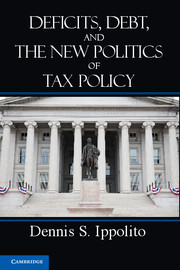Book contents
- Frontmatter
- Contents
- Figures and Tables
- Preface
- 1 A Brief History of Federal Taxation
- 2 The Stable Era – World War II to the 1960s
- 3 Destabilizing Tax Policy – Vietnam and the 1970s
- 4 The Reagan Strategy – Balancing Low
- 5 The Clinton Strategy – Balancing High
- 6 Bush, Obama, and Fiscal Deadlock
- 7 Reconnecting Taxes and Budgets
- Index
- References
2 - The Stable Era – World War II to the 1960s
Published online by Cambridge University Press: 05 December 2012
- Frontmatter
- Contents
- Figures and Tables
- Preface
- 1 A Brief History of Federal Taxation
- 2 The Stable Era – World War II to the 1960s
- 3 Destabilizing Tax Policy – Vietnam and the 1970s
- 4 The Reagan Strategy – Balancing Low
- 5 The Clinton Strategy – Balancing High
- 6 Bush, Obama, and Fiscal Deadlock
- 7 Reconnecting Taxes and Budgets
- Index
- References
Summary
During World War II, revenues climbed to more than 20 percent of GDP, by far the highest level in history at the time, with income taxes accounting for more than 75 percent of these revenues. After the war, high revenue levels remained in place, averaging 17 percent of GDP through the Truman and Eisenhower administrations, and income taxes continued to provide most of these revenues. The individual income tax was especially stable over this period, as its basic exemption levels and marginal rates went largely unchanged. As a mass tax covering most of the population, the individual income tax was the largest component of the post–World War II federal tax system.
This continuity in tax policy during the late 1940s and 1950s does not mean there were no important partisan differences over taxes. Democrats and Republicans clashed, as they had before and during World War II, over such issues as progressivity in tax burdens, corporate income taxation, and tax preferences. But these issues were typically subordinated to revenue considerations. Both the Truman and Eisenhower administrations resisted congressional efforts to cut taxes, insisting that adequate revenue levels be kept in place to fund the large Cold War defense budgets and the lesser, but still significant, domestic program responsibilities the federal government had assumed since the New Deal.
- Type
- Chapter
- Information
- Deficits, Debt, and the New Politics of Tax Policy , pp. 40 - 75Publisher: Cambridge University PressPrint publication year: 2012



